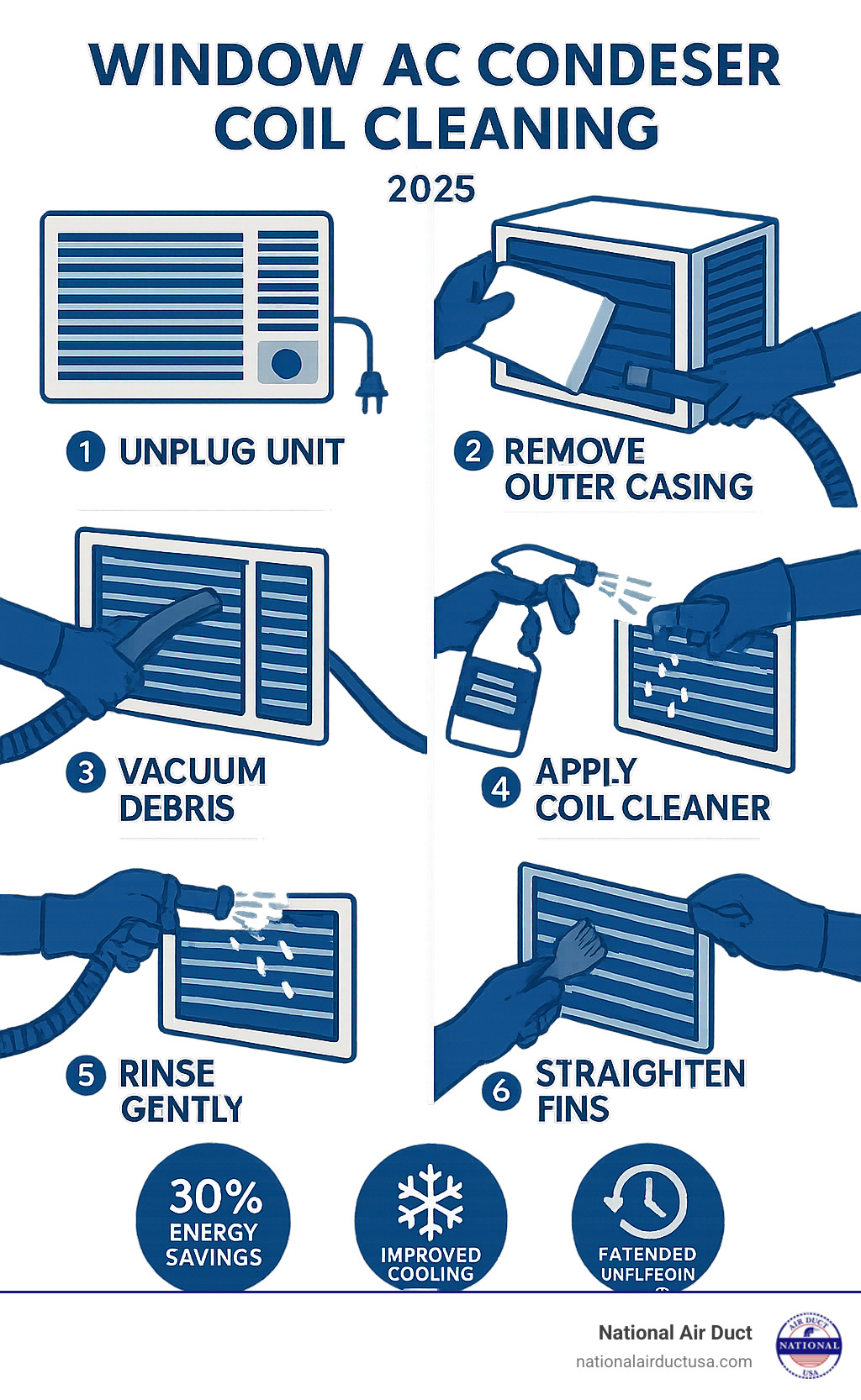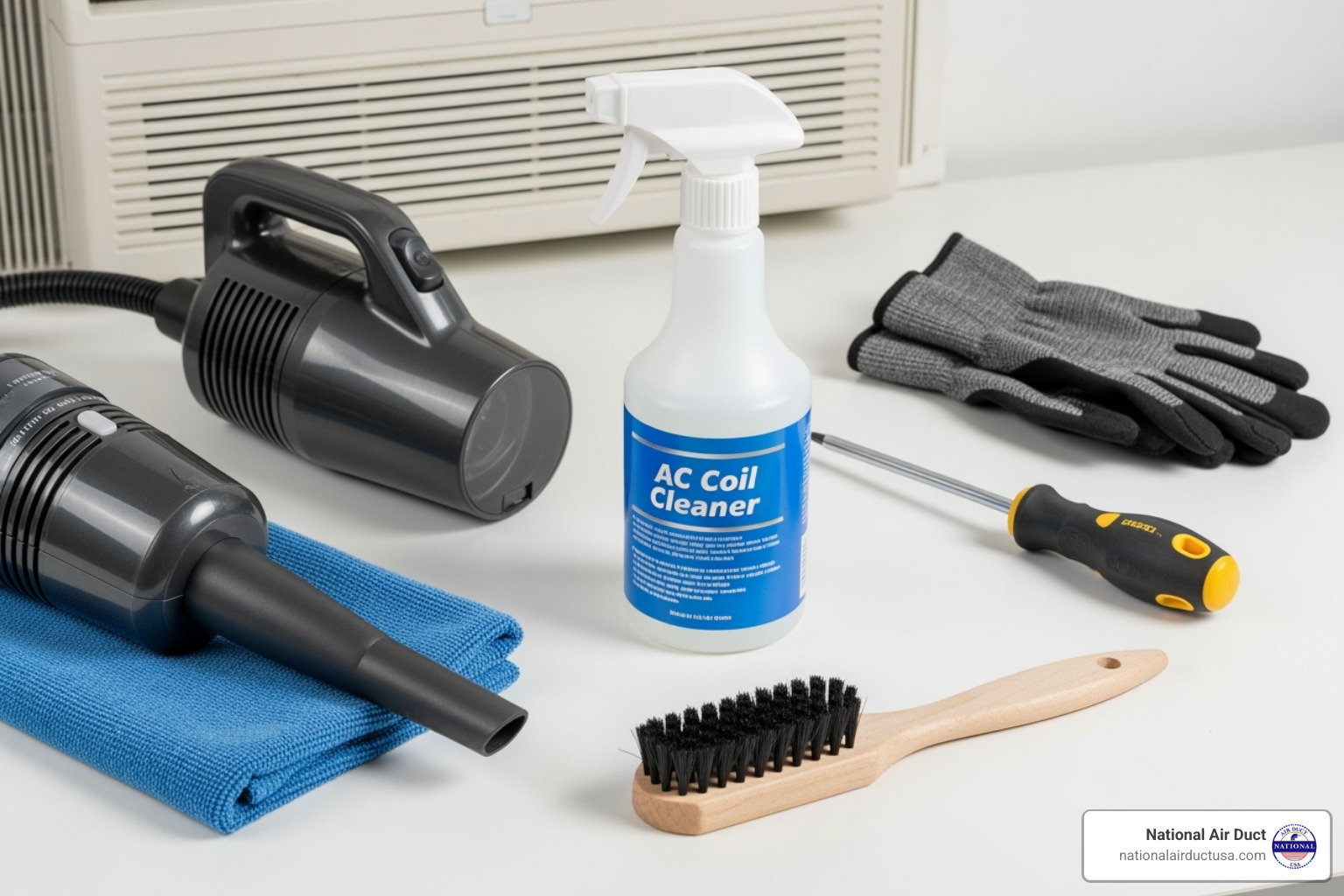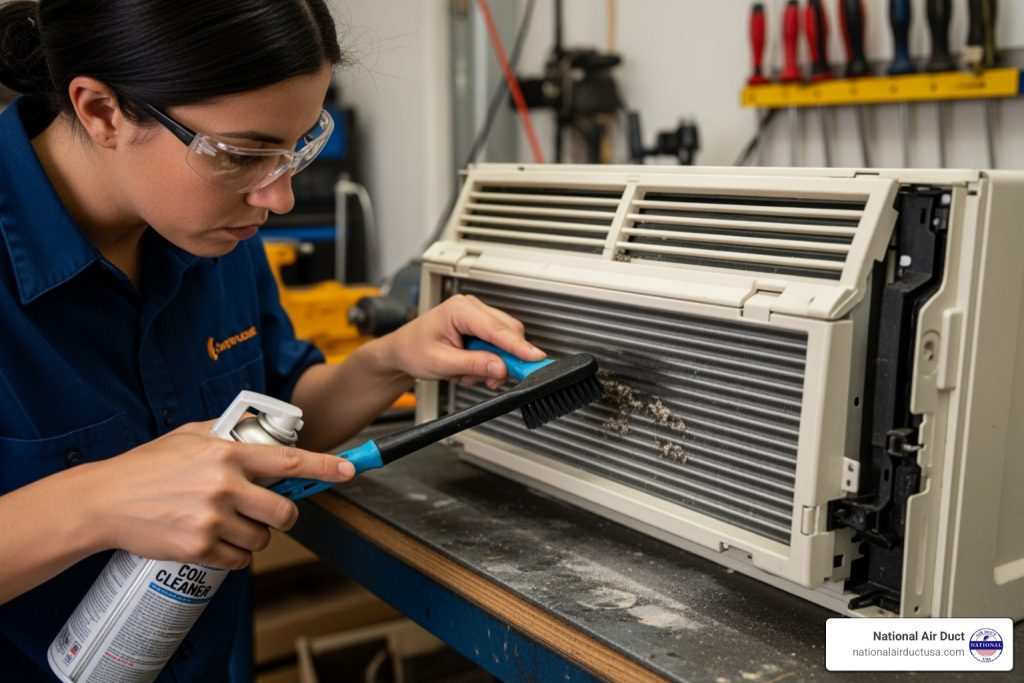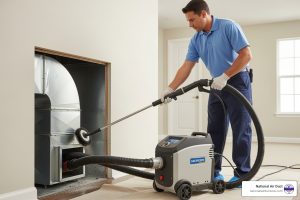Why Window AC Condenser Coil Cleaning Makes a Difference
Window ac condenser coil cleaning is essential for keeping your air conditioner running efficiently and your energy bills under control. Here’s what you need to know:
Quick Answer for Window AC Condenser Coil Cleaning:
- Turn off power and unplug the unit
- Remove outer casing to access condenser coils
- Vacuum loose debris with a soft brush attachment
- Apply coil cleaner and let it dwell per instructions
- Rinse gently with water and allow to air dry completely
- Straighten bent fins with a fin comb if needed
When the temps heat up, your window AC works overtime to keep you cool. But here’s the thing – dirty condenser coils can increase energy consumption by up to 30% and reduce cooling function by the same amount. That’s like throwing money out the window while still feeling uncomfortably warm.
Over time, dirt, dust, and debris accumulate on your AC’s condenser coils, acting like insulation that prevents proper heat transfer. This forces your unit to work harder, driving up your electricity bills and potentially shortening its lifespan.
The good news? Cleaning your window AC condenser coils is a straightforward DIY task that can restore your unit’s efficiency and save you money. Most homeowners can complete this maintenance in under two hours with basic tools and the right approach.

Why Cleaning Your AC Coils is a Game-Changer
Think of your window AC unit like a hardworking friend who’s been carrying heavy bags all day. When those condenser coils get clogged with dirt and debris, your AC is basically trying to cool your home while wearing a thick winter coat. It’s no wonder things start going downhill fast.
Window ac condenser coil cleaning isn’t just about making your unit look pretty – it’s about open uping a whole bunch of benefits that’ll make both you and your wallet happy.
When your coils are sparkling clean, you’ll notice improved efficiency almost immediately. Those coils need to release heat effectively, and when they’re buried under layers of dust and grime, they simply can’t do their job. It’s like trying to breathe through a clogged nose – everything becomes a struggle.
This efficiency boost translates directly into lower energy bills. We’re talking real money here – dirty coils can bump up your energy consumption by a whopping 30%. That’s like paying for premium gas when you could be using regular. Clean coils mean your unit doesn’t have to work overtime, and that shows up as savings on your electric bill.
Here’s something that might surprise you: clean coils dramatically improve your better indoor air quality. When moisture sits on dirty coils, it creates a perfect breeding ground for mold, mildew, and bacteria. Every time your AC kicks on, these unwelcome guests get blown around your home. Nobody wants to breathe that stuff, especially if you’ve got allergies or respiratory sensitivities.
Regular window ac condenser coil cleaning also gives you an extended unit lifespan. When your compressor and other components aren’t constantly straining against dirty coils, they last longer. It’s like the difference between sprinting uphill every day versus taking a nice, easy jog on flat ground.
And here’s the serious part – clean coils play a crucial role in fire prevention. An overworked, overheating AC unit can potentially become a fire hazard in extreme cases. Nobody wants to deal with that kind of emergency.
For more detailed maintenance tips, check out the Energy Department’s guide on Maintaining Your Air Conditioner. If you’re thinking about getting professional help for a thorough cleaning, you can learn more about our comprehensive Unit Cleaning services.
The Risks of Neglecting Your Coils
Ignoring your AC coils is like ignoring that weird noise your car makes – it might seem fine now, but you’re setting yourself up for bigger problems down the road.
System overheating is usually the first domino to fall. When dirt acts like a blanket around your coils, heat can’t escape properly. Your poor AC starts running hotter and hotter, putting stress on every component inside.
This often leads to compressor failure, which is basically the kiss of death for your AC unit. The compressor is like the heart of your system, and when it gives out due to overheating, you’re looking at either an expensive repair or a complete unit replacement.
Meanwhile, your increased energy consumption keeps climbing. Some units can use up to 40% more electricity when their coils are dirty. That’s like having an invisible energy vampire sucking money out of your bank account every month.
The moisture and trapped dirt create perfect conditions for mold and mildew growth. You’ll start noticing that musty smell when your AC runs – that’s not just unpleasant, it’s actively making your poor air quality worse. These spores get circulated throughout your home, potentially triggering allergies and respiratory issues.
If you’re wondering whether your AC might be affecting your health, Consumer Reports has an excellent article on Could Your Air Conditioner Be Making You Sick.
In extreme cases, severely neglected coils can even create potential fire hazards. When components overheat badly enough, electrical problems can occur. It’s rare, but it’s not a risk worth taking.
Telltale Signs Your Coils Need Cleaning
Your AC unit is pretty good at telling you when something’s wrong – you just need to know how to listen.
Reduced cooling performance is usually the first red flag. If your AC is running but your room feels more like a sauna than an arctic paradise, dirty coils are likely the culprit. The unit is trying its best, but it just can’t transfer heat effectively anymore.
Keep an eye on those higher than usual electricity bills. If your energy costs suddenly spike without any change in your usage habits, your AC might be working overtime to compensate for dirty coils.
That musty or mildew smell when your AC kicks on? That’s not normal, and it’s definitely not pleasant. It’s a clear sign that mold or mildew has made itself at home on your coils.
Sometimes the problem is obvious – visible dirt and debris caked on the grilles or coils themselves. If you can see the buildup, it’s definitely time for a cleaning.
Ice formation on coils might seem weird for a cooling appliance, but it’s actually a serious warning sign. Dirty coils restrict airflow, which can cause the refrigerant to get too cold and freeze moisture on the coils. If you see ice, turn off your unit immediately and let it defrost completely.
Finally, listen for unusual noises. A struggling unit might start making sounds it never made before – louder fan noise, compressor strain, or other mechanical complaints. These sounds are your AC’s way of crying for help.
Preparing for the Job: Tools and Safety
Getting ready for window ac condenser coil cleaning is like preparing for a friendly battle against dirt and grime – you want the right weapons and armor before you dive in! Having everything organized beforehand will make the whole process smoother and safer.

Essential Tools and Materials
Think of this as your cleaning toolkit – each item has a specific job to do. You’ll need a screwdriver to remove the outer casing or access panels (most window units have a few screws holding everything together). A soft-bristle brush is perfect for gently sweeping away loose dust without damaging the delicate coil fins.
The fin comb might be new to you, but it’s a game-changer. This specialized tool straightens bent aluminum fins and restores proper airflow – you can find universal kits with different blade sizes for various coil types.
For the actual cleaning, grab some commercial coil cleaner (we’ll talk about different types below) and a spray bottle with water for rinsing. Don’t forget your gloves and safety goggles – those coil fins can be sharp, and cleaning solutions can splash. Finally, lay down some old towels or plastic sheeting to protect your floors and furniture from drips.
Safety First: Essential Precautions
Safety isn’t just a suggestion here – it’s absolutely crucial when dealing with electrical appliances and cleaning chemicals. Always unplug your AC unit before starting any maintenance. This is the golden rule that prevents accidents and keeps you safe from electrical shock.
For extra peace of mind, especially if you’re working on internal components, consider flipping the circuit breaker that controls your AC unit. Work in a well-ventilated area – open those windows and doors, or even take the unit outside if possible. Those commercial cleaners can have strong fumes.
Protect electrical components by covering any wiring, motors, or control panels with plastic sheeting secured with tape. While condenser coils handle moisture just fine, other parts don’t appreciate getting soaked. And yes, actually wear that protective gear – your hands and eyes will thank you later.
Choosing the Right Cleaner for Window AC Condenser Coil Cleaning
The cleaning product you choose can make or break your cleaning success. Foaming cleaners are fantastic for heavy-duty jobs – they cling to vertical surfaces and really work into stubborn grime, though they usually need thorough rinsing afterward.
Non-foaming cleaners work well for regular maintenance cleaning and are easier to rinse off completely. Self-rinsing cleaners are the lazy person’s dream (and we mean that in the best way!) – they break down and rinse away with just condensation from normal AC operation.
If you prefer a gentler approach, a DIY solution of water and mild detergent can work for light cleaning jobs. Just remember that commercial cleaners are specifically formulated for AC coils and usually do a more thorough job, especially if it’s been a while since your last cleaning.
Why Window AC Condenser Coil Cleaning Makes a Difference
Window ac condenser coil cleaning is essential for keeping your air conditioner running efficiently and your energy bills under control. Here’s what you need to know:
Quick Answer for Window AC Condenser Coil Cleaning:
- Turn off power and unplug the unit
- Remove outer casing to access condenser coils
- Vacuum loose debris with a soft brush attachment
- Apply coil cleaner and let it dwell per instructions
- Rinse gently with water and allow to air dry completely
- Straighten bent fins with a fin comb if needed
When the temps heat up, your window AC works overtime to keep you cool. But here’s the thing – dirty condenser coils can increase energy consumption by up to 30% and reduce cooling function by the same amount. That’s like throwing money out the window while still feeling uncomfortably warm.
Over time, dirt, dust, and debris accumulate on your AC’s condenser coils, acting like insulation that prevents proper heat transfer. This forces your unit to work harder, driving up your electricity bills and potentially shortening its lifespan.
The good news? Cleaning your window AC condenser coils is a straightforward DIY task that can restore your unit’s efficiency and save you money. Most homeowners can complete this maintenance in under two hours with basic tools and the right approach.
Why Cleaning Your AC Coils is a Game-Changer
Think of your window AC like a hardworking friend who’s been carrying heavy bags all day. When those condenser coils get clogged with dirt and debris, your unit is essentially trying to cool your home while wearing a thick winter coat. It’s working twice as hard to do half the job, and that’s where window ac condenser coil cleaning becomes your wallet’s best friend.
When your condenser coils are clean, they can efficiently release the heat they’ve absorbed from inside your home. But when they’re covered in a layer of grime, that heat transfer process slows to a crawl. Your compressor and fans start working overtime, straining every component in the system. It’s like asking someone to run a marathon while breathing through a straw.
Clean coils directly translate to lower energy bills – and we’re talking about real money here. A dirty unit can gobble up to 30% more electricity than a clean one. That’s like paying for three meals but only getting to eat two. With energy costs climbing, that extra 30% can add up to hundreds of dollars over a cooling season.
But the benefits go way beyond your monthly electric bill. Better indoor air quality is perhaps the most important advantage of regular coil cleaning. When moisture from condensation meets the dirt and debris on your coils, you’ve created a perfect breeding ground for mold, mildew, and bacteria. Every time your AC kicks on, it can circulate these unwelcome guests throughout your home, triggering allergies and respiratory issues.
Regular window ac condenser coil cleaning also means an extended unit lifespan. When your compressor isn’t constantly overworked trying to compensate for dirty coils, it lasts longer. Think of it as preventive medicine for your AC – a little maintenance now saves you from expensive repairs or premature replacement later.
Finally, there’s the safety aspect. Fire prevention might not be the first thing you think about with AC maintenance, but severely overheating units can pose real risks. Clean coils help your system operate within safe temperature ranges, giving you peace of mind along with cool air.
For comprehensive information on AC maintenance, check out the Department of Energy’s guide on Maintaining Your Air Conditioner. If you’re considering professional help for a thorough system clean, learn more about our comprehensive Unit Cleaning services.
The Risks of Neglecting Your Coils
Skipping coil maintenance isn’t just about missing out on benefits – it’s about inviting a host of problems that can hit your comfort, health, and bank account hard.
System overheating is the most immediate concern. Dirty coils act like an insulating blanket around your unit’s heat exchange system. Instead of releasing heat efficiently, your AC starts running hotter and hotter, putting enormous stress on every internal component.
The compressor failure risk is particularly scary because it’s often a death sentence for your unit. Your compressor is essentially the heart of your AC system, and when dirty coils force it to work in overheated conditions, it can fail prematurely. Compressor replacement often costs more than buying a new unit entirely.
We’ve mentioned increased energy consumption before, but it’s worth emphasizing – a neglected unit can use up to 40% more energy than a clean one. That’s not just an environmental concern; it’s money flowing out of your pocket every single month.
Mold and mildew growth creates both health and comfort issues. The combination of moisture, warmth, and trapped debris creates an ideal environment for microbial growth. You’ll start noticing that musty, damp smell when your AC runs – that’s your unit telling you it needs help. For more information about how your AC might be affecting your health, check out this resource on Could Your Air Conditioner Be Making You Sick.
Poor air quality becomes a daily reality when your AC circulates mold spores, dust, and other allergens throughout your home. Instead of providing clean, cool air, your unit becomes a distribution system for respiratory irritants.
Potential fire hazards represent the most serious risk. While uncommon, severely neglected coils can cause extreme overheating that leads to electrical shorts or component failures. It’s a risk that’s completely preventable with regular maintenance.
Telltale Signs Your Coils Need Cleaning
Your window AC unit is actually pretty good at communicating when it needs help – you just need to know what to listen and look for.
Reduced cooling performance is usually the first red flag. If your AC is running but your room isn’t getting as cool as it used to, or if it’s taking much longer to reach your desired temperature, dirty coils are likely the culprit. The unit is working, but heat transfer efficiency has dropped significantly.
Higher than usual electricity bills often catch homeowners by surprise. If your energy consumption spikes without any changes in your usage patterns, your AC might be working overtime to compensate for restricted heat transfer. It’s essentially running a marathon when it should be taking a leisurely jog.
Musty or mildew smells are your nose’s way of alerting you to microbial growth. That damp, stale odor when your AC runs is a clear indicator that mold or mildew has found a home on your coils or in your drain pan. This isn’t just unpleasant – it’s a health concern.
Visible dirt and debris sometimes makes the problem obvious. If you can see dust, pet hair, lint, or other debris caked on your grilles or coils, your unit is practically begging for a cleaning.
Ice formation on coils might seem weird for a cooling appliance, but it’s actually a clear distress signal. Dirty coils restrict airflow, which can cause refrigerant to get too cold and freeze moisture on the coils. If you see ice, turn off your unit immediately and let it defrost before attempting any cleaning.
Unusual noises are your AC’s way of complaining. You might hear the fan working harder than usual, or the compressor straining under the extra load. These sounds are telling you that your unit is struggling to do its job efficiently.
Preparing for the Job: Tools and Safety
Before we dive into the nitty-gritty of window ac condenser coil cleaning, gather our supplies and ensure we’re ready to tackle the task safely. Think of it as preparing for a friendly wrestling match with dirt and grime – we need the right gear!
Essential Tools and Materials
Having everything at hand will make the process much smoother. Here’s what we’ll need:
- Screwdriver: Often needed to remove the outer casing or access panels of your window AC unit.
- Soft-bristle brush: Ideal for gently sweeping away loose dust and debris from the coils without damaging them.
- Fin comb: A specialized tool designed to straighten bent aluminum fins on the coils, restoring proper airflow. You can often find universal kits with interchangeable blades.
- Commercial coil cleaner: Specifically formulated to break down dirt, grease, and grime on AC coils. We’ll discuss types in more detail below.
- Spray bottle with water: Useful for rinsing, especially if your cleaner isn’t self-rinsing, or for mixing a mild DIY solution.
- Gloves: To protect your hands from dirt, cleaning chemicals, and potentially sharp coil fins.
- Safety Goggles: Essential to protect your eyes from dislodged debris and cleaning solution splashes.
- Old towels or plastic sheeting: To protect your floor or furniture from drips and spills, especially if cleaning the unit in place.
Safety First: Essential Precautions
When dealing with electrical appliances and cleaning solutions, safety is paramount. We want to clean our AC, not create a new problem!
- Unplug the AC Unit: This is the golden rule! Always, always unplug your window AC unit from the electrical outlet before you begin any cleaning or maintenance. This prevents accidental electrocution or the unit turning on unexpectedly.
- Disconnect Power Source: For an added layer of safety, especially if you’re working on the unit’s internal wiring or suspect any electrical issues, consider flipping the circuit breaker that controls the AC unit.
- Work in a Well-Ventilated Area: If you’re using a commercial coil cleaner, ensure you’re in a well-ventilated space. Open windows and doors, or even take the unit outdoors if feasible, to avoid inhaling fumes.
- Protect Electrical Components: While condenser coils are designed to handle moisture, it’s crucial to protect any electrical wiring, motors, or control panels from direct contact with water or cleaning solutions. You can cover them with plastic sheeting or bags secured with tape.
- Wear Protective Gear: Those gloves and safety goggles aren’t just for show! They will shield your hands from sharp fins and chemicals, and your eyes from splashes and flying debris.
Choosing the Right Cleaner for Window AC Condenser Coil Cleaning
The market offers various coil cleaners, each with its own advantages. Understanding the types will help us pick the best one for our needs.
| Cleaner Type | Pros | Cons |
| Foaming Cleaners | Expands into tight crevices; Good for stubborn dirt and grime; Many are “self-rinsing” (washed away by condensation). | May require multiple cans for heavily soiled units; Can be messy if not applied carefully; Some users prefer to rinse even if self-rinsing.



